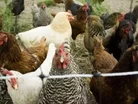Chickens, eggs, and how the worst bird flu in history is costing the poultry industry

The avian flu has descended on the United States poultry industry, and it’s not progressing lightly. According to reports, this strain of flu is being spread by asymptomatic geese and ducks and is making its way across the country in record time. Spreading from Oregon across the Midwest U.S., afflicting more than 32 million birds within its path so far, researchers are already identifying this outbreak as the worst incidence of avian flu in United States history. But how is this affecting the food production and processing industries?
The effect on the poultry industry directly has been devastating. Millions of chickens and turkeys have been killed off in an attempt to keep the outbreak from spreading. The loss of poultry and egg-laying chickens is having an effect that, as one local news source close to the heart of the outbreak reports, is more than just immediate—producers will be feeling the effects of the outbreak for months to come, well into the holiday season:
It practically goes without saying that the price of eggs, chicken, and turkey will rise as a result of this, an issue that could potentially lead to lower sales and lower yearly profits for producers and retailers. Washington Post reports that cartons of eggs in the Midwest have risen 17 percent in price, while the price of chicken meat has risen three to 10 percent.
But more than just basic commodities like eggs and poultry are susceptible to price hikes—food processing companies are also affected by having to pay more for raw materials:
These processors will ultimately have to make a choice as well whether to eat the extra cost and decrease bottom lines or pass it along to consumers via a bump in price for value-added products.
[SOURCE: Fortune; Washington Post]



